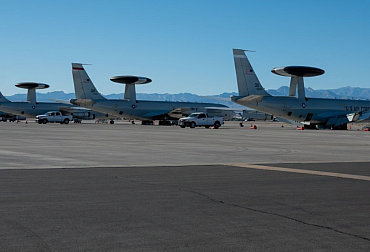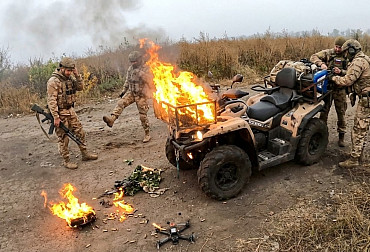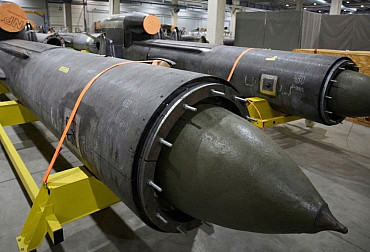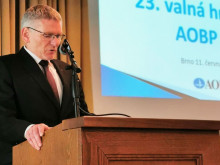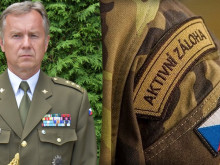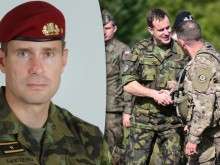Impact of the Coronavirus on the Army of the Czech Republic and the Domestic Defence Industry
The current situation around the coronavirus raises a number of questions about the future of our army and the domestic defence industry, so we asked Jana Černochová, the Chairwoman of the Defence Committee, some of the recent ones.
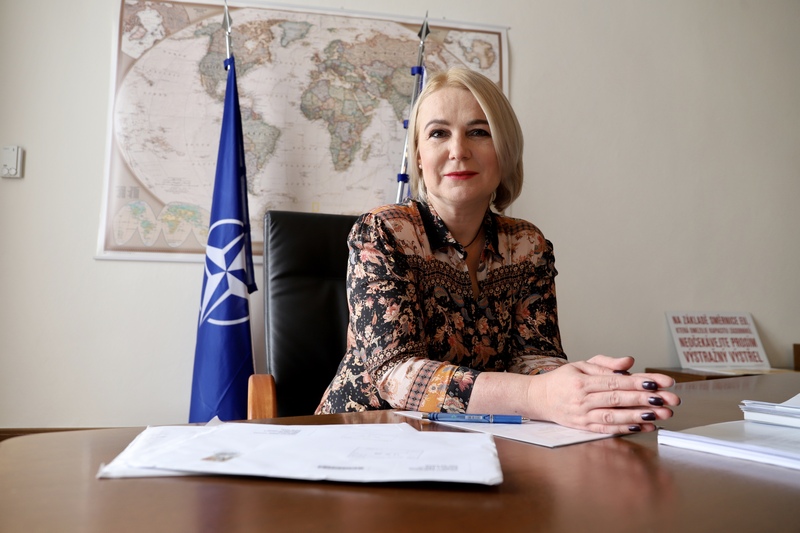
Picture: Jana Černochová, the Chairwoman of the Defence Committee | archive of Jana Černochová
1) Madam President, if you look at the development of government measures, what do you think about them? Many people blame the government for muddling, non-conceptual measures.
The time to assess the government's steps is yet to come. The crisis is still ongoing and it is always good to evaluate everything with the benefit of hindsight and in context. In general, I am glad that the Czech Republic took action earlier than other countries. But it is necessary to realize that government measures are brought to life only thanks to a quick and devoted response, but also improvisation of rescuers, doctors, nurses, police officers, soldiers and many other professions. Many thanks to them. And of course thanks to all those who sat down and started sewing face masks and making other protective equipment, because if we were to wait for the resumption of supplies, we would still be wearing scarves over our mouths at best.
It is surprising just how unprepared the state was for emergency supplies of protective equipment, although we spoke about it in the end of January in the Chamber of Deputies, where Minister of Health Vojtěch explained, among other things, that the efficacy of masks in connection with Chinese flu is doubtful. I may be even more surprised that the state has no overview of domestic products, or more precisely of the ability of domestic companies to convert production from one type of product to another. Companies and other institutions had to start organizing themselves, help themselves and start producing much needed protective equipment and other products. Many of them pay for all of that themselves.
I also regret that we sent a gift to China, but then we had to pay for all the protective equipment and testers, unlike other countries. And our representatives thank for this with tears in their eyes. It is a sad situation.
Finally, I would like to mention two more things that surprised me and might not stop surprising me. The Czech Republic has developed a pandemic plan, the latest update of which took place in 2011 during the reign of the ODS party. Since then, it has probably not been updated, because this is the version published on the government website. Unfortunately, it seems to me that the government does not follow this plan, which describes in quite a detail what to do at any given moment. That is also suggested by the long delay of the establishment of the central crisis staff. Only that introduced some order to the management of the crisis.
But there will certainly be time for a detailed assessment of the measures when the crisis is over
2) Recently, the press has been asking in their articles where the Minister of Defence Metnar is. Do you think that a man in his position should be more visible and participate in all the press conferences and negotiations? After all, he is a representative of the power resort. Minister Hamáček seems to be much more involved.
This is due to the fact that this is an internal crisis, so it is the Ministry of the Interior and other ministries, such as the ministries of Health, Industry and Finance, who is responsible for managing it, even according to legislation. I would definitely not blame the Minister for not pushing his way into every press conference and not being in all the media every day. After all, if we treat the crisis as a PR show, we have already lost in advance. All of us.
In domestic crises, the military should support IRS bodies. At times when they cease to manage or need some unique technology owned only by the military, then it should intervene. At that moment, the Minister should probably be more visible and should attend press conferences.
3) What do you think about the proposal of Lubomír Metnar, the Minister of Defence, who recently proposed to strengthen the power of the government, or rather the prime minister, in the state of emergency and state of war if Parliament could not meet?
The debate on how to meet the requirements of legislation on proclaiming individual states and passing laws, if the legislature could not meet, has been running for fifteen years. It is not a trivial matter to be decided by officials, but a highly political one. Simply put, we will not avoid this debate, but there is no reason to hold it now.
By the way, modern technologies already make it possible, for example, for committees to operate through video conferences. The Chamber of Deputies adapts to this not only technologically but also in legislation, because it is necessary to adjust the regulations to ensure for example, voting etc. I am already discussing a number of things with my colleagues at a distance. This should of course be taken into account in this debate.
4) General Opata recently called on soldiers to take care of their health and to protect it, but on the other hand, there is evidence that our soldiers were not sufficiently equipped with adequate means of protection in time and often had to procure them themselves or they were donated by private entities. Where do you see a mistake and what do you think the deployment of soldiers should look like? Is it the fault of an individual or of the whole system?
Deployment of soldiers, as well as facing the crisis, must be managed from one place and under the patronage of one person. The decision-maker is the central crisis staff, where all requirements and information are gathered, measures are defined and planned. It is not up to the soldiers to determine themselves where they should be deployed in the case of domestic crisis and what they should do. They must participate in crisis management, participate in planning, but it should be primarily those responsible for dealing with the domestic crisis who should have the last say. All the more so, as a legislator, I do not have a say about where and what units are to be deployed.
In general, in times of crisis, decision-making should be in the hands of one or a few people. Everybody has an opinion, we can read more than enough of them in the media every day, it resembles people shouting over one another until it makes no sense. But nothing can be managed that way. Management is associated with responsibility and there is only one responsibility.
Concerning protective equipment, it is generally a mistake and a demonstration of insufficient preparedness for crisis situations. After all, I have been drawing attention to this for a very long time, and this crisis has shown that I have done so quite rightfully. Already last year, for example, I repeatedly protested against the sell-off of metals from the state material reserves without any deep analysis. I believe that this sale was primarily motivated by budget redevelopment, not on the basis of a well-thought-out idea.
However, it is not just about protective equipment. It is overall a system of securing supplies of raw materials, semi-finished products and finished products, the state must have an overview of production capacities, must prepay the companies to hold the production lines and retain trained personnel so that the basic needs can be met for a certain period of time when supply chains break up.
It is therefore not only about storage, but also about production capability and overview. But the state cannot do everything. Nor is it right and necessary. The state has to pass on parts of the responsibility to private companies and demand performance in times of crisis. It does not matter whether it is protective equipment or small arms production. The state has to pay companies for the damage they incur because of these requirements. As we can see now, it would be cheaper than living in a sense of delightful and eternal peace and then suddenly spending money chaotically. But the main point is that the money remains at home.
When this crisis is over, it is necessary to sit down and look at the whole problem holistically, that is to say as a whole, and to propose a system that will be gradually carried out over the oncoming years. I certainly expect that the legislation needs to be changed in some areas so that the new system can work effectively.
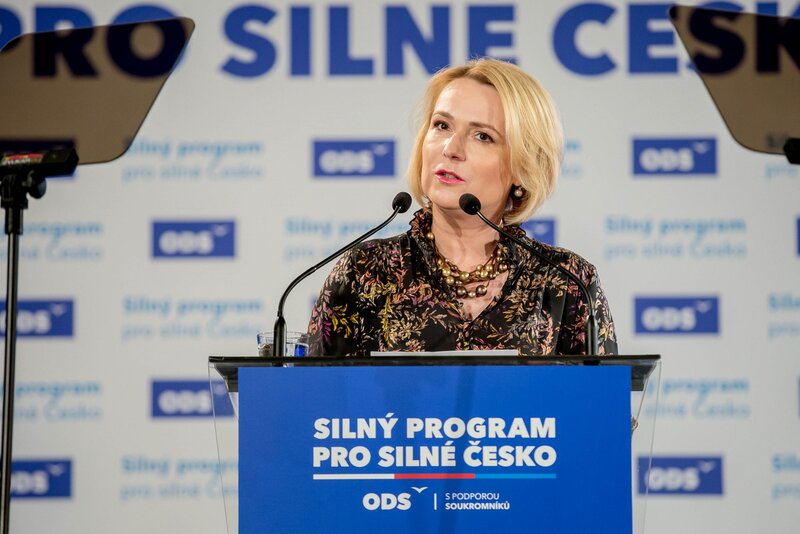
Picture: Jana Černochová, the Chairwoman of the Defence Committee | archive of Jana Černochová
5) Do you expect that the current crisis situation will also affect the recruitment of new soldiers or members of Active Reserves?
It is very difficult to estimate, the deployment and increase of visibility could help increase the interest in Active Reserves. However, for those interested in professional service, it depends more on the perspective in addition to visibility. In recent years there has been a relatively high interest in joining the army and Active Reserves due to several factors, such as legislative changes, increasing soldiers' incomes, temporarily halted and then slowly released recruitment, creating a larger reservoir of candidates. The worsening of the security situation also helped. However, in recent years, a higher age of recruits has been apparent, which was partly due to the fact that people who have left the army return to service.
We are now in a period of demographic decline, so the number of suitable candidates for service is decreasing. We will see how the economy and unemployment will develop. However, the rise in unemployment does not automatically mean a higher interest in service in the security forces and the armed forces. Many unemployed are actually not suitable for recruitment.
6) It is very likely that as a result of the viral pandemic, the government will revise the budget for military modernization projects in the oncoming months. Most of them have the condition that the Czech defence industry must be involved. Their cancellation or postponement will therefore affect not only the military, but also the domestic industry. What should the government do to minimize the impacts?
First of all, the Ministry of Defence should proceed systematically and conceptually. We cannot start recklessly cutting and saving. Within a few months, we first need to review the latest Concept of the Build-up of the Armed Forces (CBAF) or develop another crisis document that would assess the situation and propose measures for the coming years. Experts outside the ministry, former professional soldiers, economists and others should also be involved in the preparation of this document.
The already approved CBAF was at least financially viable even without a pandemic. I was surprised how easily it was approved, when the signs of the cooling of the economy had been apparent since the previous year, and it was clear that the army could hardly reach the money it described in the document. But someone has probably promised them the money.
We are in a situation where the military has been counting on money for modernization projects, which are important not only for the military, but for all of us because we are securing ourselves for the next crisis. It is not possible to come and say: "Sorry army, hold on with what you have for another twenty years." Soldiers are used to obeying, but I don't have to, so if this happens, I honestly say we would just pretend to have an army, but there would be nothing left. And I don’t want that.
It is therefore necessary to sit down, discuss which projects are crucial and must not be constrained or delayed and which can move at a slower pace. But most importantly, we need to start working more with different forms of financing, to use bonds, for example, to use instalment loans, to involve more of private companies, which would be guaranteed by the state, and so on. And above all, the primary contractors for the Ministry of Defence must be Czech companies, not only state-owned companies, but also private companies. The Ministry must become more creative and flexible.
7) As regards the savings in the defence sector due to the coronavirus crisis, the infantry fighting vehicle (IFV) project is logically the first to go down because of its scale. Do negotiations with competitors continue in this situation? What is the next milestone of the project and when should it occur? Is it possible to limit the project (to a smaller number of vehicles) or to cancel it altogether?
When the situation calms down, it will certainly be one of the important topics of the Subcommittee on Defence Acquisitions and the Defence Committee. I don't want to speculate now how it will turn out. Generally speaking, the priority is to deal with long-term funding so that it won't happen that the military has nothing but new infantry combat vehicles, or a few new vehicles, a couple of cannons and a little bit of everything – it looks nice in the photos, but overall it will not make sense.
8) How can the state meet the commitments towards NATO (spending 2 % of GDP on defence) and at the same time deal with the expected high budget deficit?
Ensuring security and defence is a fundamental pillar of the state. Citizens expect to be protected in the event of internal and external crisis. So we should behave accordingly and not cut expenditure on the army, police, firefighters and other forces. As I said above, there are more ways of financing and we should look for them now.
9) Many businessmen and producers are already talking about the need for state assistance to bridge the economic downturn and production volumes due to the pandemic. Most Czech defence industry companies live mainly from exports, so in the longer term, they will be affected more by measures in the world than by decisions of the Czech government. However, it paradoxically points out how little the Czech state relies on its own production and material base in the areas of defence, strategic reserves and population protection. Shouldn't this situation change fundamentally? How should the state treat the enterprises of strategic importance and how should it contribute to the establishment and existence of a stable strategic production base that such enterprises could (or should) form as a whole?
I have talked about this before. Yes, the state should develop a comprehensive system of preparation for crisis situations. On the other hand, it is illusory to assume that the Czech state will be able to purchase and pay for everything the domestic defence industry produces and in such quantities that the development and mass production would be worth it. Export will remain crucial.
The state should therefore create conditions for development and innovation and invest much more money in both defence and dual industries than it does now. Secondly, a state fund should be set up to guarantee or directly finance exports to the countries of priority for our foreign policy. Not only exports of products, but also services and construction of the necessary infrastructure.
10) The pandemic and related problems of the lack of protective and medical equipment occur not only in our country but also in the world and they show how much the economy of not only the Czech Republic, but also our allies and partners in the EU and NATO is service oriented. Western companies exported production and know-how to China, a country with a totalitarian, communist regime. In the past, it would have been unthinkable for the countries of the European Economic Community or NATO to have their goods manufactured in the Soviet Union and to supply top-notch know-how or military technology there. What lessons should the Czech Republic and other Western countries learn from the current crisis in the future, especially as regards their own development and production capacities?
The pandemic will only speed up what has been apparent for several years, and that is moving production capacity from China to other countries. What contributed to this trend was the increase in the price of labour in China and the problems the companies have with the communist regime and its practices. The world has changed a lot over the past thirty years, and globalization and the global division of labour have created great opportunities but also threats. It is not possible to suddenly turn everything back and do a 180 degrees turn. We need to find an appropriate compromise in the individual areas, as I mentioned in the previous answers.
11) Is the Ministry of Defence considering to create a package of investment projects in the framework of anti-crisis measures to support the domestic industry?
This is a question for the Ministry. I assume that perhaps so, and that we will discuss individual proposals in the Defence Committee.
12) The SALIS system has provided us with transport capacity (transport aircraft Antonov An-124 Ruslan), but do you think that the army should have its own capacity? The existing CASA aircrafts do not have large transport capacities, the supply of others is suspended due to cuts and the purchase of a business jet to replace the outdated and failure Challenger is cancelled as well.
Yes, we should have more transport capacity than we have. We should return to the plan for the purchase of the third Airbus, we should return to the idea of acquiring a medium transport aircraft, and we should ensure, in cooperation with other countries, the strategic transport capability. We definitely need that. However, we are talking about billions and billions of crowns and yet we do not know what the economy will look like in autumn.
There is nothing worse in such a situation than shooting from the hip and competing with ideas when everyone has more than enough of them according to their preferences. The only meaningful approach is to sit down and create a long-term plan, taking into account the turbulent period that we will now be facing.
13) In your opinion, what capabilities and capacities in the field of special and defence industries are currently lacking in the Czech Republic, but could be successfully built and developed with the active contribution of the state?
It is certainly the means of exploration, whether it is optics or other systems of detection, communication, command and control, jammers, cyber defence, robotic devices and the like. It would be a mistake, however, to forget traditional skills such as small arms, the manufacture and repair of ground and air technology, and so on. We need a mix, not just focus on one area.
14) What about the social sphere? It can be expected that the consequences of coronavirus will make tens of thousands of Czech citizens lose employment/business. Will these people react to the need for investment in the military in the time of peace and in times of economic impact on all sectors?
It is a question of explanation and perception. I hope we will be successful now. Much has changed in the last ten years. We thought what a turning point September 11 was, but I think that we in Europe did not really understand it security-wise until 2014. Perhaps we have learned a lesson and we all understand that it is not possible to get a stronger army through cuts in budgets.












